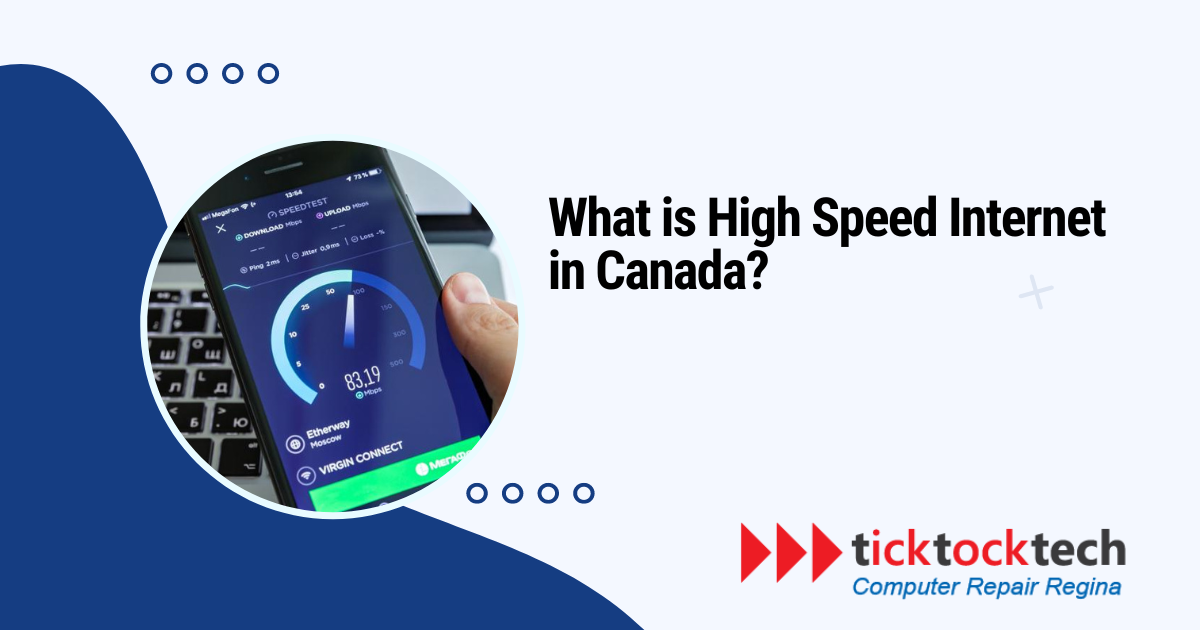The best part of the internet is not having internet, is having high-speed internet. In developed countries like Canada, 96.5% have access to the internet, but a lower percentage might have access to high-speed internet. The definition of high-speed internet could sometimes be relative. In case you are not aware, the speed of the internet is the rate at which it transfers and receives data. This could be directly from a server, dish, or satellite. It is commonly measured in megabits per second (Mbps) and can vary from a few hundred Mbps to several gigabits per second (Gbps).
In Canada, the Internet is provided by different companies in different transmission modes. This could be via Fiber-optics, Cable, Satellite, and Mobile internet. The definition of high speed is different for each data transmission mode. Now, let’s have a look at what you should consider “high speed for each category” and the possible providers that have such speed plans in Canada.
Slow Internet? Here’s How to Test and Measure Your WiFi Speed
Cable Internet Speed
Cable internet is a highly sought-after high-speed internet choice in Canada. This technology utilizes the existing cable TV lines to provide internet connectivity to residential homes. The speed ranges of cable internet in Canada can vary depending on the provider and the package you select. In Canada, cable high speeds can vary from 50 Mbps to 1 Gbps, with the highest speed available being 1 Gbps. Download speeds generally vary between 25 Mbps and 150 Mbps.
A technician will visit your home to install cable internet by connecting a coaxial cable from the provider’s main line to your modem. The modem will establish a connection with your devices either through WiFi or Ethernet cables. The installation process is quite simple and can be completed within a few hours.
Satellite Internet Speed
Satellite internet is a potential high-speed internet option in Canada, especially for people who live in remote areas where cable and fiber optic internet services are not available. It uses a satellite dish to connect to the internet, which is then sent to your modem.

Their speeds in Canada normally range between 10 Mbps and 100 Mbps, which is significantly slower than cable and fiber optic internet. Satellite internet, on the other hand, is an excellent choice for individuals who reside in rural places with no other internet access alternatives.
Related: Starlink Review: Plans, Price, and Speed in 2023
A technician will come to your home to install a satellite dish for your internet connection. The dish will be connected to a modem, allowing you smooth connectivity to your devices via WiFi or Ethernet cords. The installation process may take longer than with cable internet since the technician must guarantee that the satellite dish is properly aligned with the satellite.
Fibre Optics Internet Speed
Among the several high-speed internet options available in Canada, fiber optic internet is thought to be the most reliable and quickest alternative. The use of light signals that are sent through thin plastic or glass fibers makes it feasible to achieve data transfer speeds of up to ten gigabits per second.
When it comes to download speeds, Canadians may experience speeds ranging from 50 Mbps up to 1 Gbps, depending on the plan they choose.
A technician will be dispatched to your residence to install a fiber optic cable to connect your modem to the main line that is provided by the provider. Considering how simple the installation process is, you should be able to complete it in a few hours.
Mobile Internet Speed
Mobile internet is an excellent choice for individuals who require internet access while on the move. The device utilizes cellular networks for internet connectivity, offering speeds that can range from 10 Mbps to 1 Gbps. Cellular networks offer a range of mobile internet speeds, from the reliable 4G with speeds of up to 20 Mbps, to the lightning-fast 5G that can exceed 100 Mbps.

The installation process is designed to be easy for users. It involves acquiring a SIM card, selecting a data plan, and making sure that your device is compatible. Another option is to buy a mobile hotspot device and subscribe to a mobile internet plan with a service provider. The device is capable of connecting to the provider’s cellular network, allowing you to easily connect your devices to the hotspot using WiFi.
What is Considered High-Speed Internet in Canada?
In Canada, high-speed internet is typically described as having speeds of 15 Mbps or higher. There are different types of internet connections available, including cable, fiber optic, and satellite internet. Typically, cable internet speeds range from 25 Mbps to 150 Mbps, whereas fiber optics can provide speeds of up to 1 Gbps.
Satellite internet is a popular choice in remote areas, offering speeds ranging from 12 Mbps to 100 Mbps. Mobile internet, which is accessible via cellular networks, offers a range of speeds. With 4G, you can expect speeds of around 20 Mbps, while 5G can provide speeds exceeding 100 Mbps. Nevertheless, the speed requirements for high-speed internet can differ based on the provider and the package selected.
What are the Best Cheap High-speed internet Providers in Canada?
There are several internet service providers in Canada that provide high-speed plans that are both dependable and inexpensive. Cable internet service providers such as Rogers and Shaw Communications provide solutions that are both affordable and convenient. People who are interested in fiber optics might investigate the options offered by Bell TekSavvy, Oxio, and Telus.
Two prominent satellite internet companies provide competitive rates: Xplornet and Starlink. Both of these providers serve distant locations. Plan options from Fido, TravelWifi, and Koodo are also available to mobile internet consumers who are looking for affordable options. By analyzing their unique requirements, geography, and patterns of usage. Canadians will be able to select the most suitable and affordable high-speed internet service that meets their specific objectives.
FAQs
Telus, Bell, and Rogers are among the greatest network providers in Canada, offering fast internet and dependable services. However, the title is frequently contested because speeds vary depending on location, infrastructure, and the exact package you select.
While cable internet offers reasonable speeds, it falls short of the lightning-fast capabilities of fiber optics. Fiber-optic internet is the reigning speed champion, providing unsurpassed performance for data-intensive applications.
Several internet applications, such as Speedtest, Fast.com, and Google’s Measurement Lab, give precise measurements of your connection. Simply click ‘Go,’ and these tools will assess your download and upload speeds. This allows you to guarantee your digital canoe is paddling at maximum efficiency.

